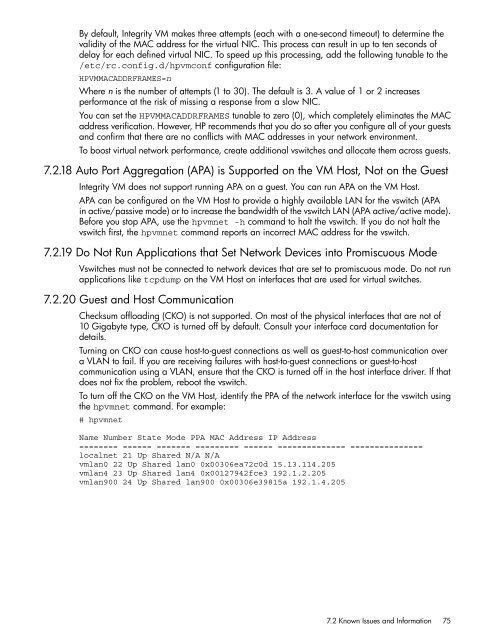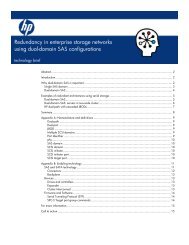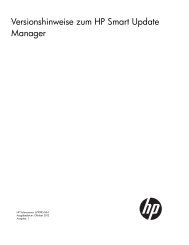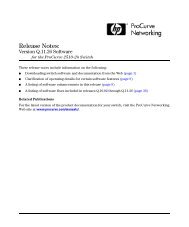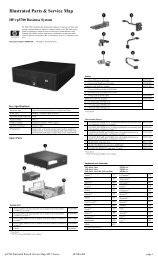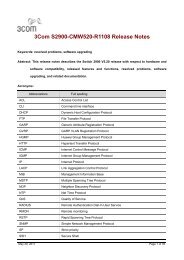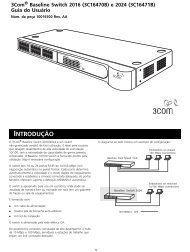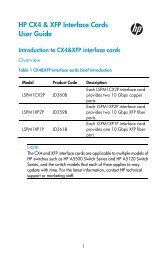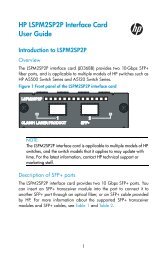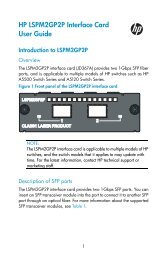HP Integrity Virtual Machines 4.2.5 - HP Business Support Center
HP Integrity Virtual Machines 4.2.5 - HP Business Support Center
HP Integrity Virtual Machines 4.2.5 - HP Business Support Center
Create successful ePaper yourself
Turn your PDF publications into a flip-book with our unique Google optimized e-Paper software.
By default, <strong>Integrity</strong> VM makes three attempts (each with a one-second timeout) to determine the<br />
validity of the MAC address for the virtual NIC. This process can result in up to ten seconds of<br />
delay for each defined virtual NIC. To speed up this processing, add the following tunable to the<br />
/etc/rc.config.d/hpvmconf configuration file:<br />
<strong>HP</strong>VMMACADDRFRAMES=n<br />
Where n is the number of attempts (1 to 30). The default is 3. A value of 1 or 2 increases<br />
performance at the risk of missing a response from a slow NIC.<br />
You can set the <strong>HP</strong>VMMACADDRFRAMES tunable to zero (0), which completely eliminates the MAC<br />
address verification. However, <strong>HP</strong> recommends that you do so after you configure all of your guests<br />
and confirm that there are no conflicts with MAC addresses in your network environment.<br />
To boost virtual network performance, create additional vswitches and allocate them across guests.<br />
7.2.18 Auto Port Aggregation (APA) is <strong>Support</strong>ed on the VM Host, Not on the Guest<br />
<strong>Integrity</strong> VM does not support running APA on a guest. You can run APA on the VM Host.<br />
APA can be configured on the VM Host to provide a highly available LAN for the vswitch (APA<br />
in active/passive mode) or to increase the bandwidth of the vswitch LAN (APA active/active mode).<br />
Before you stop APA, use the hpvmnet -h command to halt the vswitch. If you do not halt the<br />
vswitch first, the hpvmnet command reports an incorrect MAC address for the vswitch.<br />
7.2.19 Do Not Run Applications that Set Network Devices into Promiscuous Mode<br />
Vswitches must not be connected to network devices that are set to promiscuous mode. Do not run<br />
applications like tcpdump on the VM Host on interfaces that are used for virtual switches.<br />
7.2.20 Guest and Host Communication<br />
Checksum offloading (CKO) is not supported. On most of the physical interfaces that are not of<br />
10 Gigabyte type, CKO is turned off by default. Consult your interface card documentation for<br />
details.<br />
Turning on CKO can cause host-to-guest connections as well as guest-to-host communication over<br />
a VLAN to fail. If you are receiving failures with host-to-guest connections or guest-to-host<br />
communication using a VLAN, ensure that the CKO is turned off in the host interface driver. If that<br />
does not fix the problem, reboot the vswitch.<br />
To turn off the CKO on the VM Host, identify the PPA of the network interface for the vswitch using<br />
the hpvmnet command. For example:<br />
# hpvmnet<br />
Name Number State Mode PPA MAC Address IP Address<br />
======== ====== ======= ========= ====== ============== ===============<br />
localnet 21 Up Shared N/A N/A<br />
vmlan0 22 Up Shared lan0 0x00306ea72c0d 15.13.114.205<br />
vmlan4 23 Up Shared lan4 0x00127942fce3 192.1.2.205<br />
vmlan900 24 Up Shared lan900 0x00306e39815a 192.1.4.205<br />
7.2 Known Issues and Information 75


